QuestionQUESTION: Hi, i take care of a colony now, and trying to reduce numbers, several got rehomed, and currently have 3 males 1 female kitten.
'BIG daddy' is currently the boss, 2 more females are being returned after they give birth, so
3 males, 3 females. Much less that before.
Problem Big daddy has taken over and will not let the other males eat. I know once the females come back the order will probably change. Everyone is fixed and has shots now, except one who is very tricky to catch, ( a stray, if i can catch him he can be adopted)
Any ideas on how i can take care of the other 2 males without the battle? currently safe in my backyard, moving the feeding area is almost impossible as the neighbours really do not like this TNR thing, but last year we had to rescue over 20 kittens, so this is good solution.
Thanks so much. Oh Big daddy also has taken over the shelters too.
ANSWER: Marianne,
It's nice to run into another kitty caregiver who works at providing the necessities of life for stray and feral cats in the area's colony. I realize that caring for stray and feral cats can sometimes cause tension between the person caring for these cats and those who oppose caring for colonies. Sadly many people forget that the feral cats within the colony are quite likely descendants of abandoned strays. It's an unfortunate fact that some human caregivers would rather abandon their cat than take responsibility for them and give basic medical care including spay/neutering their pets as early as possible. Maintaining a feral cat colony is a smart, responsible choice for a number of reasons - for instance you've taken the initiative to spay/neuter the colony members which means that you've effectively controlled the population. It might be worth speaking with the neighbors so that they understand basic things like the fact that noise levels related to mating and fighting are minimized because the cats have been sterilized. The fact that you provide these cats with food, water, shelter and medical care means that the neighbors don't have to see sick cats and kittens suffering until they finally pass on. Ultimately colony maintenance is important to keep the cats healthy, sterilized, well fed, vaccinated, etc because this makes the neighborhood a safer place for all of your neighbors and their children.
As for the difficult to catch kitty I think that you may find a humane live trap loaded with sardines, tuna, salmon or something else that's equally as smelly useful. Since the cat is timid he may have been the victim of cruel treatment by people trying to chase him away so it would probably be best to cover the trap with a large towel or small blanket and move somewhere out of sight. Sometimes covering the trap allows the cat to feel safer during the attempts to trap him - most fearful cats like small, dark, quiet places to hide in. You could also choose to put the trap under a porch or deck because your fraidy cat might hide in such a place so it might make the capture less difficult and stressful on him. When using a trap it's very important that you're around to monitor it because cats can suffer horribly if left in the trap for extended periods of time, I normally monitor mine by checking them every 1/2 hour or so.
Homeopathy is based on the principle that like cures like, in fact the more diluted a remedy is the more powerful it's effects are said to be. If the remedy that I've recommended isn't doing the trick it's not a bad idea to go back to your local health food store or other retailer and ask to see the chart for Bach Flower Essences. You're sure to find a remedy that's effective, safe and gentle. It's important to realize that homeopathy can sometimes be compared to peeling an onion in that there are sometimes problems underneath the initial issue that require treatment. Homeopathy is a drug free way to cure certain health and behavioral issues and unlike the pharmaceutical approach giving the wrong remedy won't cause your kitty harm.
You might find a homeopathic remedy called Bach's Rescue Remedy helpful in this situation. It's a blend of flower essences designed to calm and reassure, I've used this remedy many times over the years in a variety of situations and it's been a safe, effective way of dealing with cats who have been traumatized, abused, abandoned, or under-socialized to the point of being generally fearful of all people. You can usually find Rescue Remedy in health food stores, naturopathic pharmacies, some mainstream pharmacies carry it in the aisle with vitamins/nutritional supplements and I believe that you can purchase this remedy online as well. The best way to administer it for feral/fearful stray cats is to add it to their water bowl or mix it very well into some canned cat food. As long as the cats get a chance to eat and drink it should help to reduce the tension between them, in fact since Big Daddy is hogging the food he'll get a bit more Rescue Remedy which is probably a good thing in your situation. I'd suggest that you add about 6 drops per food/water dish in your yard and for the time being it's probably best to try and spread the food/water dishes and shelters as much as possible. The further apart things are the less effectively Big Daddy can guard/hoard the resources that you're providing for the entire colony. Rescue Remedy is perfectly safe when used with basic common sense, I've had pet parents ask me about the possibility that they can overdose their cats on this remedy. You could actually administer this remedy at several times the recommended dosage without causing harmful effects in your cats.
You mentioned that you have two pregnant queens that you plan to return to the colony after they've given birth and been spayed to prevent more litters of kittens from being born. If the moms are comfortable enough with people that they will allow you to handle their babies then I'd strongly suggest allowing the kittens to stay with mom at least until she weans them on her own which normally happens in the first 8-10 weeks of life.
Kittens learn many important skills during their first weeks of life, which is why it's so important to socialize them appropriately from the beginning. Queens teach their kittens how to hunt, pounce on and kill prey, defend themselves, recognize feline body language and respond appropriately to it and they also learn to control the force behind their claws and teeth during play. Young kittens are cute but for the sake of adoptability it's important to properly socialize them so that they behave appropriately with people of all ages, shapes, colors and sizes. Well behaved kittens have a better chance of living in a permanent home.
It's important that nobody ever allows a cat or kitten, regardless of how adorable they are, to chew any of your possessions because while it may initially be cute it won't be quite as cute in a full grown cat. It's very important that those people handling the kittens never allow them to bite, scratch or attack any part of their body - this includes hands, feet, fingers and even toes under the blankets at night. Kittens should be taught that they can play with mom, their siblings and toys - human hands are for petting, grooming and transportation only and it's never okay to scratch or bite human skin during play.
Early socialization is very important because the stakes are high - if a kitten thinks that biting or scratching is a game their adoptive family may euthanize, abuse, abandon or relinquish their cat to a shelter because a biting/scratching cat is a liability. Behavioral issues can be deadly serious - in North America the leading cause of death in cats is euthanasia due to behavioral problems. This fact is all the more heartbreaking when we consider the fact that many problems are completely preventable by properly socializing cats early in life, other serious behavioral issues can be prevented or reduced in intensity by spaying/neutering kittens as early as possible.
There are a number of opinions about how old kittens should be when they leave their mother and move into adoptive homes. I've cared for many kittens over the years and in my experience kittens who stay with their mother for the first 10-12 weeks are less likely to have certain health and behavioral issues. I realize that this may not be practical or feasible when dealing with feral queens, however if the moms are co-operative in terms of allowing you to handle the kittens regularly it's best to allow mom to care for her kittens until they're at least 8-10 weeks old. The longer the kittens stay with mom the less fragile they'll be. There are advantages to keeping kittens with their mom for at least 10 weeks: by the time they go into their adoptive home they've been socialized, they've been eating solids for awhile which means that they won't normally have issues with low blood sugar - this can happen quite suddenly in kittens 9 weeks old or younger and it can be fatal if not discovered in time. By the age of ten weeks kittens have learned some basic etiquette in terms of how they socialize with other cats and their human caregivers.
Newborn kittens have minimal resistance to viral/bacterial infections so it's important to keep mom and her babies away from any other pets in your household. It's also important to be sure that anyone who handles the moms and their kittens takes time to thoroughly wash their hands in hot, soapy water, that will reduce the likelihood of passing along some sort of infection. The first few weeks of a kitten's life also include milestones such as potty training, eating solid food and learning skills like bite inhibition and not using their sharp claws/teeth on any part of any person's body which are important parts of their socialization and will help to ensure that these baby predators are as adoptable as possible.
Kittens learn about things like litter training, using scratch posts and how to interact politely with people from their mother.
When the kittens start being more mobile (2-3 weeks of age) it's a good idea to make kitten sized litter pans available - a cheap, easy and disposable solution is to use aluminum pans with low sides from the grocery store, the ones meant for baking are best, the lower the sides are the sooner the kittens will begin to explore their litter pans. I would recommend that you use a non toxic, natural kitty litter such as one made from wheat or corn to ensure that the kittens won't become sick if they eat the litter and many kittens will, at least initially. As the kittens see mom using a litter pan they will eventually copy her in most cases.
Unlike dogs nursing queens don't require any human help to wean their kittens, this normally happens some time in the first 8-10 weeks of a kitten's life. I would recommend providing mom and her newborn family with a comfy bed made from a cardboard box lined with old towels or a blanket, the box should be large enough for mom and her babies to stretch out and nurse comfortably, have low enough sides that mom can come and go easily but the box should also have high enough sides to prevent the tiny newborns from wandering off on their own. I recommend against ever allowing mom and her newborn kittens sleeping in bed with any person because kittens can easily be suffocated if someone accidentally rolls onto them during the night.
Mom should have access to as much fresh water as she likes, she should also have as much of a high quality cat food as she wants because she's providing for her nutritional needs as well as those of her rapidly growing babies. I normally suggest that pet parents consider feeding a high quality, holistic cat food made from human grade ingredients. I've found that Wellness and Spot's Stew by Halo are good quality foods and they're made from human grade ingredients. Wellness is meant to be fed as a combination of canned and dry food which can be a bit pricey. I feed my cats Spot's Stew Sensitive Cat by Halo, a 6 lb bag costs roughly $25 and lasts my 3 resident cats about a month, that works out to about 28 cents per cat per day. You can choose to feed canned food, dry food or any combination you like. Mom's food intake can double, triple or even quadruple in some cases while nursing kittens because she has to meet her own nutritional needs as well as those of her rapidly growing family. High quality foods may initially appear expensive when compared to brands sold in grocery/discount stores. When cats are fed a high quality food they tend to eat less because they don't need as much food to meet their nutritional needs. Litter box deposits are less frequent and less pungent which means that you use less kitty litter over the long term. It's also important to note that most cats who are fed high quality foods have fewer health problems which means that you spend less money at the vet's office. Another advantage to high quality nutrition for your cat is that she'll likely live a much longer, healthier life and her kittens will have the best possible start in life.
If you need any further information about kitty nutrition, kitten socialization or other issues I'm more than willing to offer opinions based on my experience. Since you're taking care of this colony it might be worth your while to check out a book called The Natural Cat by Anitra Frazier and Norma Eckroate, it has some great information about TNR programs and dealing with the concerns of neighbors. Alley Cat Allies is another great organization that may help you find ways of reassuring your neighbors, addressing their concerns and easing tensions that may exist with those caring for these cats. I would also recommend that you check out the following website: www.neighborhoodcats.org, you can also call them at 212-662-5761 if you'd like to speak with someone in person.
---------- FOLLOW-UP ----------
QUESTION: Thank you for your detailed response and concern for the feral Queen kitties. The Queens are still being fostered with their kittens until the volunteer feel it is good time to separate. Thanks to Toronto Cat Rescue volunteers.
They are all "trained" for 1 - 2 times of day with a whistle for food time. Usually they all share same plate, or take turns with ladies first, which comes in really handy for clean up and cold winter.
Leroy (m) and Pinky (f) are both under a year and still eat alot. They will undoubtedly be consuming BRR is that okay?
I will spread the food out to 2 plates and and separate shelters. My yard is very small 15' wide x 20' long
Thanks for the tip on super smelly food for the Stray.
Will give it a go this weekend.
TNR has been an awesome experience and relief, it is really hard to get, persistence pays off. No more stinky sprays, no worries about kittens, way less fighting, no missing ears, tails or blood trails, no howling major sessions.
It is much more peaceful and nice to see the cats that are truly feral even having fun, playing and looking healthier.
AnswerMarianne,
I'm glad that I could offer some help - it's an honor to help others who are like minded about the best way to manage feral cat colonies. I did wonder about the term BRR, I'm not familiar with it so I can't offer much help....
Hopefully the neighbors will begin to see how important proper colony management is and how it pays off in the long run....I wish you and your colony the best of luck....Take good care of these guys, they don't have many folks in their corner.

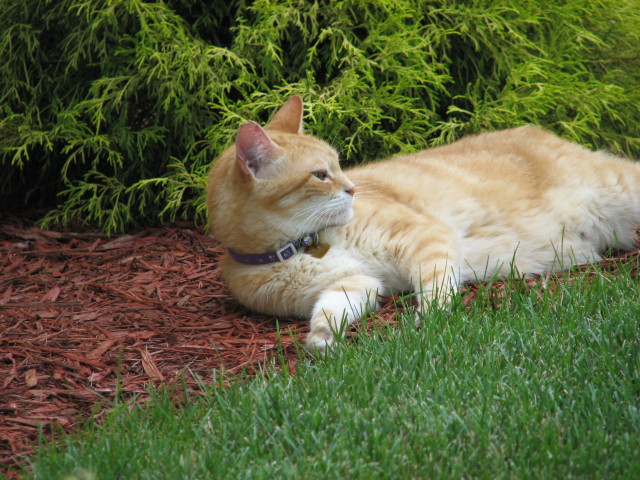 18 yr old male cat
Question
Simon at 13 years
My cat is 18 years ol
18 yr old male cat
Question
Simon at 13 years
My cat is 18 years ol
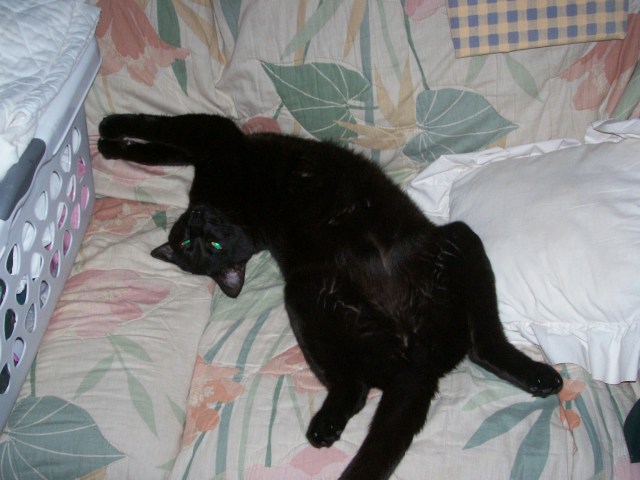 cat breed?
QuestionQUESTION: I have a solid black male cat, and I
cat breed?
QuestionQUESTION: I have a solid black male cat, and I
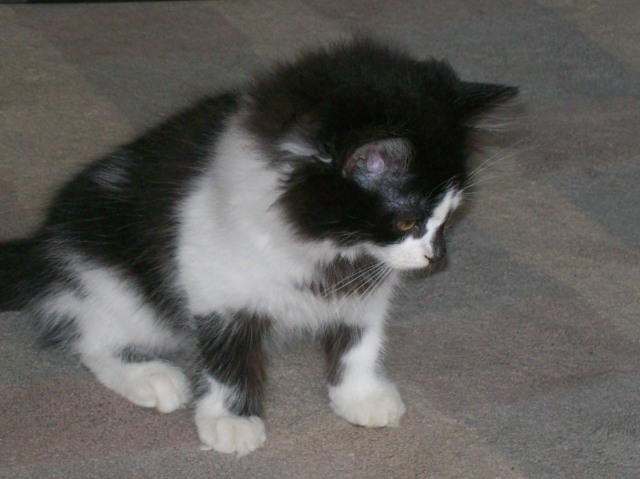 handling my 9 week ferel kitten
QuestionMillie
QUESTION: Hi. My lovely 9 week ki
handling my 9 week ferel kitten
QuestionMillie
QUESTION: Hi. My lovely 9 week ki
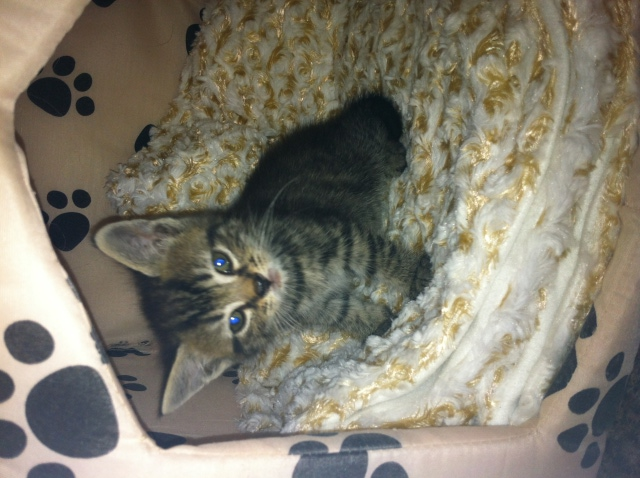 Bengal kitten?
Question
Pic Picture
Hello, I was wonderi
Bengal kitten?
Question
Pic Picture
Hello, I was wonderi
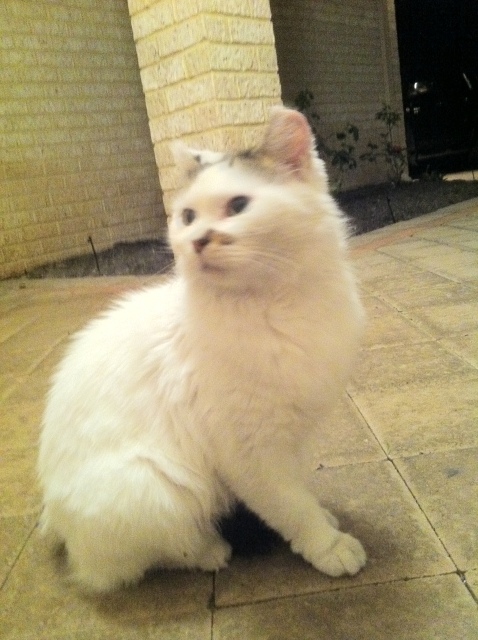 Pregnant cat and her to be kittens.
Question
Scarlett
Recently (May 2011) we adopted a stra
Pregnant cat and her to be kittens.
Question
Scarlett
Recently (May 2011) we adopted a stra